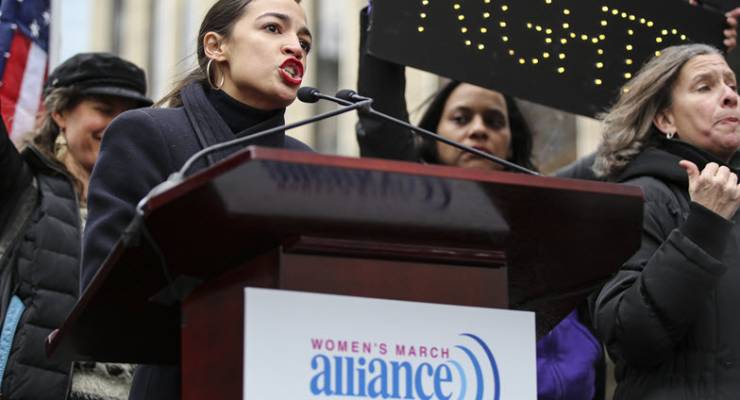
This is the second in a two-part series. Read part one, “Does Australian politics have a millennial problem?“, here.
Earlier this year, former race discrimination commissioner Tim Soutphommasane wrote a short op-ed explaining why he thought a figure like the internet savvy, high profile 29-year-old US Democrat Alexandria Ocasio-Cortez (aka AOC) would have trouble gaining a foothold in Australia. While it perhaps undersells Australia’s young politicians, he’s not wrong that there are plenty of barriers to entry for young people looking at a career in politics.
We asked young Australians across the political spectrum for their views. Could Australian politics produce an AOC? And if not, why not?
Bridging the cultural gap
For a start, reforming parties’ sexual harassment policies would go some way toward bringing in and keeping young women and gender-queer politicians. All interviewees Crikey spoke to for this piece, including the Young National, acknowledged a sense of ageism and condescension from older colleagues.
Similarly, challenging the media’s fairly conservative discourse, which is obviously easier said than done, would help make people outside the white, male, rich status quo feel safe.
People like Greens candidate Joanna Nilson, Yassmin Abdel-Magied or Warriors of the Aboriginal Resistance’s Tarneen Onus-Williams could achieve greater things in a fairer media environment, especially one that better understood millennial culture and circumstances.
“The types of people that are involved in the Greens, and definitely the young Labor left, are the sort of people that will have a past on social media,” Nilson told Crikey. “Or will engage with other users on Twitter in a satirical fashion that’s really unique to the platform.”
“The question we have to ask of our public servants in that respect is, ‘Have they harmed or threatened anyone? Broken the law?’ No? So why should that preclude someone from serving this country?’”
Keeping it local
Local government, unsurprisingly, offers young people a less politicised, more accessible avenue to enter politics. Jake Keough, a 23-year-old Victorian Labor mayor, says working in local government has enabled him to push for youth issues such as high-density affordable housing, while still being able to juggle law school and club football.
But what young people might gain from council in terms of accessibility, they lose in living standards, which can further alienate young people who come from lower socioeconomic backgrounds. Sydney’s 34-year-old deputy lord mayor, Jess Miller, will this year step down from her position citing an unsustainable council pay of $39,540 per year plus $19,734 as deputy.
Throughout her time in council, she has learned to demystify politics and not to “overestimate the competition”, but believes a better wage for councillors would help address the “disconnect between people who are making decisions and the people affected by them”.
“We probably need a really, really serious re-think of how the parties operate and connect, the fact there aren’t a great deal of options and that depends largely on major donors,” Miller said. “I’d be shining a light on ‘where does the money come from?’”
Ending the careerist glut
Complaints about both cash for access and career politicians were rife among interviewees. With nearly half of all federal Liberal MPs former staffers, officials or advisers, and more than half of all lobbyists coming from inside government, it’s unsurprising that the more candid calls for reform come from Greens and independents.
Tyson Koh, spokesperson for former anti-lockout group Keep Sydney Open, says the group became a full-fledged political party after doing “everything that you’re meant to do as a grassroots campaign”, including protests, petitions and meeting with former premier Mike Baird, and still coming up short.
Koh has hit out at the “merry-go-round” between government and industry, and, under the umbrella of the single issue of “lockout laws, which is a lot more complex and involved than what people initially gave it credit for,” the group will this year contest the NSW election calling for stronger ICAC powers and investigations into public infrastructure, reforms over political donations and revolving door lobbyists, and ending special treatment for casinos.
After a year in parliament, Greens Senator Jordon Steele-John lists his major concern for young people as whether Australia “will have a democracy to participate in within the next couple of decades”.
“Because the extent of political corruption, cash for access, hundreds of millions of dollars of corporate money that flows through our system and by certain industries like the banking sector, for instance, the ability to really write their own legislation… that is a massive intergenerational challenge,” Steele-John said. “It means that the corporate power of sectors like the mining industry, like the gambling industry, tobacco, is put against the needs of young people in a way that so often negatively affects us.”
Finally, 30-year-old Greens Councillor Jonathan Sri believes that, “young people are right to be really cynical of electoral politics but that doesn’t mean we should turn our back on it altogether”.
“When we take our eye off this game, that’s when they screw us the most.”








Until the internal processes of the major parties change, there will be little of no plurality of politicians in state or commonwealth parliaments, for the young, for minorities, for the disadvantaged. One must get a job as an ‘adviser’ in a sitting politician’s office and then, as a faceless, nameless smart-arse in a suit, learn the ropes about how it all works to turn into a facsimile of the politicians we have to have any chance of being endorsed as a candidate. It is not just the young being excluded from politics. It is everyone who is not prepared to take oneself too seriously as a ‘policy’ expert that is excluded from politics.
Seriously, keep your AOC, we’ve got JSJ ? Or did you not see him because he’s in a wheelchair ?
I mean, seriously, he’s about 5 years younger than AOC too.
Yeah, ok , a bit much, sorry.
The article doesn’t talk about the difference between here and the US. There is much greater poverty in the US than here. At least part of that is caused by and exacerbated by lack of a national health system like Medicare. The party system in the US has much less internal policy unity and discipline. Here, mavericks like AOC are much more constrained in publicly airing internal policy disagreements.
Life is very tough for a sizable minority in the US and declining towards that for many others. Much worse than here. Basic US social statistics are going backwards. This is what produces people like AOC.
Pity about the box ticking, reflexive name check of YAM as a possibility.